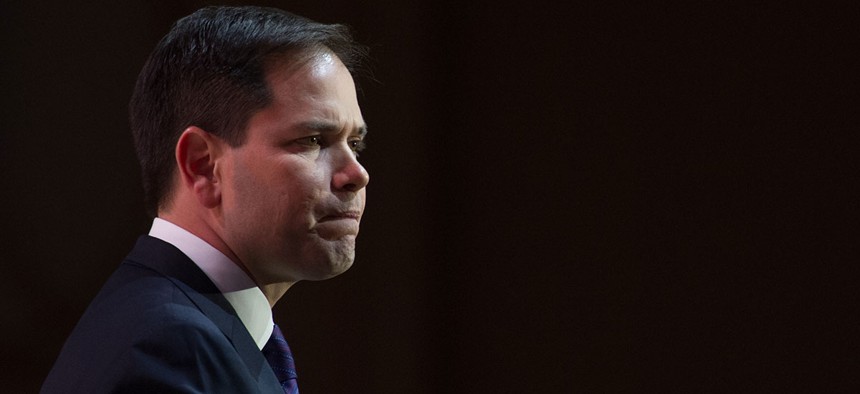
Christopher Halloran / Shutterstock.com
Paul Ryan Says the House Won't Take Up Immigration Reform. Does That Help or Hurt Marco Rubio?
The new speaker says the House won't pass a bill while Barack Obama is in office—a vow that could help Marco Rubio in the primary but hurt him in the general election.
There’s a lot that no one knows about Paul Ryan’s nascent tenure as speaker, from what his new roadmap for the House GOP will be to how long the party’s conservative wing will give him a break. But one thing that’s certain is there won’t be immigration reform any time, soon, he says.
“The House of Representatives will not vote on comprehensive immigration legislation as long as President Obama is in office,” Ryan writes in USA Today. “And the reason is simple: The American people can’t trust him to uphold the law.” Ryan continues:
He has tried to go around Congress by ordering his administration to create a new legal status for undocumented immigrants. Even a federal district court says he has overstepped his bounds. The first principle of any immigration reform has to be securing our border and enforcing the laws already on the books. But that is the very principle the president has violated.
No one was sitting around with high expectations for immigration reform between now and January 2017, but Ryan’s column confirms that the door isn’t just shut; it’s locked. Still, the decision could have an impact on the presidential campaign—and in particular on the prospects of another young conservative rising at the same time: Senator Marco Rubio. The most plausible scenario for Rubio, lately deemed the great establishment hope for 2016, is that it could be a boon during the Republican presidential primary but a drag during the general election.
Following the 2012 election, a Republican National Committee autopsy famously called for the party to embrace immigration reform. “If we do not, our Party’s appeal will continue to shrink to its core constituencies only,” the post-mortem report said. “We also believe that comprehensive immigration reform is consistent with Republican economic policies that promote job growth and opportunity for all.”
Not every Republican agreed, and many of the party’s grassroots remained (and remain today) strongly opposed. But one politician who took up the challenge was Rubio, who joined the bipartisan group seeking an immigration overhaul. When the effort foundered, Rubio distanced himself from reform. Nowadays, he’s more likely to talk about the importance of enforcing laws.
By ruling out immigration reform, Ryan seems to be doing Rubio a favor in the short term, during the Republican primary. While Rubio’s rivals—Chris Christie and Donald Trump, recently—love to bring it up to attack him, it’s good news for him if immigration isn’t a major topic in the news, because it serves to remind GOP primary voters of Rubio’s dalliance with comprehensive reform.
But come the general election? If the RNC autopsy was right, having immigration reform off the table could hurt Rubio—or any other Republican nominee, for all the reasons the report’s writers laid out then. Because Rubio, the son of Cuban immigrants, is Hispanic, he might be able to dull the effect, but not taking up reform might very well be a drag on Republicans in 2016.
What if it’s enough of a drag to elect a Democrat? As much as President Obama’s assertions of executive power to reform the immigration system have infuriated Republicans, both Hillary Clinton and Bernie Sanders (and for that matter Martin O’Malley) have vowed to go even further with executive actions if elected. Given that Republicans are likely to hold on to the House, that could mean that Ryan’s pledge might actually hold on for much longer than just the Obama presidency.
(Image via Christopher Halloran / Shutterstock.com )
NEXT STORY: The Price Leaders Pay for Silence






